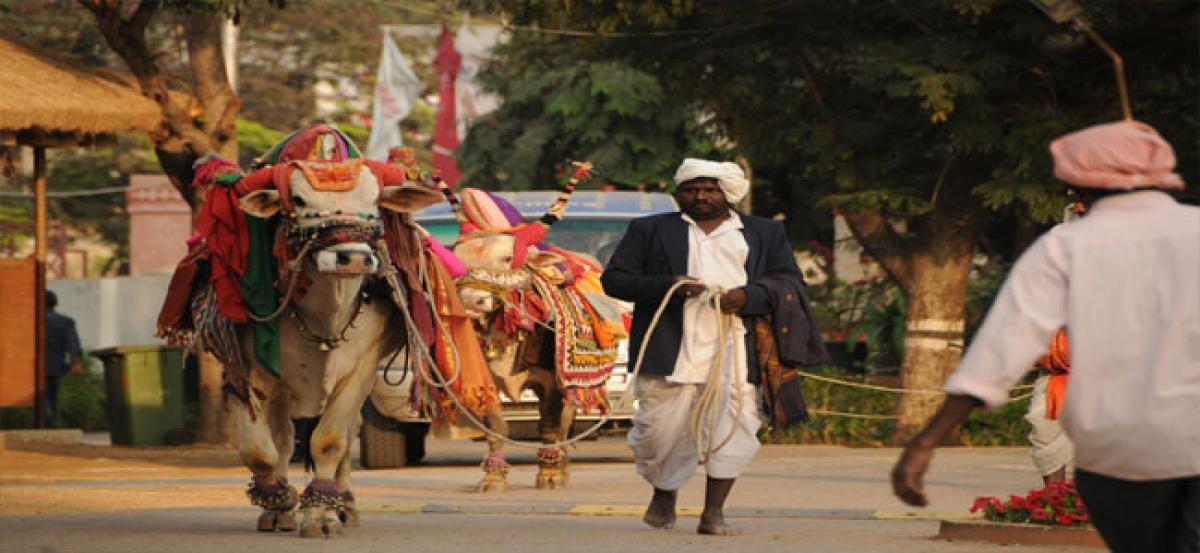Live
- Tremors in city after earthquake jolts TG
- 44 transgenders recruited as traffic police assistants
- Rosaiah’s skills helped TG attain surplus budget: CM Revanth
- Medaram earthquake not unusual: Seismic experts
- BRS resents commoner becoming CM: Revanth
- Walt Disney: The visionary behind a magical empire
- Salesforce Faces Margin Slowdown Amid Strong Q3 Results
- Nani Wins Mega Fans’ Hearts with His Support for Chiranjeevi’s New Film
- Infusion Nursing Society Hosts 12th Annual Conference at Yashoda Hospital, Hyderabad
- HDFC Bank to Organise 16th Annual Blood Donation Drive on December 6, 2024
Just In

From the melodious ‘Sannai Melam’ that whisks the winter fog away to the festooned bullocks which accompany their masters, Sankranthi festivities remain incomplete without the traditional ‘Gangireddula Kolahalam’. Accompanied by colourfully decorated oxen, the master roams the streets of the twin cities and recite folk ballads to celebrate the season of harvest, happiness, and prosperity.
Secunderabad: From the melodious ‘Sannai Melam’ that whisks the winter fog away to the festooned bullocks which accompany their masters, Sankranthi festivities remain incomplete without the traditional ‘Gangireddula Kolahalam’. Accompanied by colourfully decorated oxen, the master roams the streets of the twin cities and recite folk ballads to celebrate the season of harvest, happiness, and prosperity.
Rural tradition has it that the calf born on a "Gandha Amavasya" represents the divine spirit of Lord Narasimha Swamy who would adorn his "Nijarupa" on that day. Hence the calf would be given to a temple from where it is given to a basavanna at a nominal price and be prayed as a "Gangireddu".
As part of the Kolahalam act, the master would make the bull stand on a plate, nod its head, bend its knees etc to grab the attention of both the old and young alike. In return, people would take the Gangireddu's blessings and donate alms to the Basavanna in either cash or kind or sometimes both, with a belief that it would bring them good luck.
However, with the growing influence of western lifestyle in the twin cities and caste occupations losing its importance, the gangireddolu too began to disappear from the urban landscape. So many of the Basavannas who depended on the Gangireddu melam for their income began to opt for other alternative sources of livelihood to sustain themselves and their families.
" I hail from Medak. The traditional art of Gangireddu Kolahalam has been passed on to me by my forefathers. For us, it is not an occupation but a way of life. Earlier, begging through it, was the only means to earn a living but eversince the art lost its value in the society,
our family had taken up farming activities to help us lead a normal life. Despite hardships, we still come to Hyderabad every year during Sankranthi and Diwali to follow our age-old culture. It might not be very rewarding, but it is our tradition and needs to be preserved. People can forget about us, but we definitely remember to keep the Sankranthi traditions alive." explains Ramesh, a Gangireddu master.
Moreover, the beggars' act instated by the State government during Ivanka Trump's visit, too showed its impact on the Gangireddu this year. Fearing that they might be arrested for taking alms in the city, many preferred to perform in villages and small towns while a few fought against the unruly laws of the State government.
But putting all the rumours to rest, the police assured the Basavannas that they would not be imprisoned but will be allowed to follow their practices much to the joy of the Gangireddu owning community. Finally, Sankranthi is on its way!

© 2024 Hyderabad Media House Limited/The Hans India. All rights reserved. Powered by hocalwire.com







